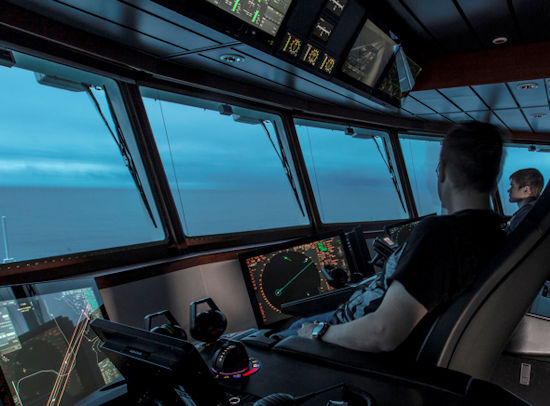ROI when Upgrading Your IBS

Let’s talk about giving your vessel’s nerve center, the Integrated Bridge System (IBS), a facelift with the latest tech. Wondering what’s in store with a modern IBS upgrade? You’re about to find out.
* Please send feedback/suggestions to editor @ shipuniverse.com
Navigating the New: Unpacking IBS Upgrades
Modern IBS upgrades are more than just slapping on a new coat of paint. We’re talking about infusing your bridge with cutting-edge tech – think smart navigation tools, automated systems for safety, and digital compliance aids. It’s like upgrading from an old-school flip phone to the latest smartphone.
Click here to find your Ideal IBS
Why Opt for an Upgrade?
Now, you might wonder, “Why fix something that isn’t broken?” Well, it’s all about staying ahead in the game.
- Operational Efficiency: New IBS means smoother sailing – literally. With advanced navigation and more automation, you’re looking at fuel savings and faster voyages.
- Safety First: Upgraded systems come with better safety features, reducing the risk of accidents and ensuring the well-being of your crew and cargo.
- Regulatory Compliance: The maritime world’s rules keep evolving. An updated IBS keeps you in line with the latest regulations, avoiding those pesky fines.
- Staying Competitive: In a sea of ships, an upgraded IBS can be your ace – offering better services, more efficiency, and, of course, happy customers.
Revamping the Giants – IBS Upgrades for Container Ships
Welcome back, maritime moguls! Today, we’re zeroing in on container ships – the workhorses of international trade – and how sprucing up their Integrated Bridge Systems (IBS) could be a game-changer. Let’s unpack what this upgrade means for your fleet of giants.
Upgrading the Big Players: What’s in Store?
Container ships are massive, complex beasts, and upgrading their IBS isn’t just about adding a few new screens. We’re talking:
- Advanced Navigation Systems: Think state-of-the-art GPS, electronic chart displays, and automated routing that can outsmart even the trickiest weather conditions.
- Enhanced Communication Tools: Satellite comms that keep you connected with shore and other ships, no matter where you are on the high seas.
- Fuel Optimization Features: Systems that tell you the best speed and route for fuel efficiency – because every drop of fuel saved is money in the bank.
Breaking Down the Costs
Alright, let’s talk numbers. Upgrading a container ship’s IBS isn’t pocket change, but it’s an investment. You’re looking at:
- The Price Tag: Depending on how fancy you go, an IBS upgrade can range from a couple hundred thousand to a few million dollars.
- Installation and Training: Don’t forget the cost of getting the new system up and running and training your crew to use it. It’s an essential part of the package.
Counting the Benefits: Show Me the Money!
Now for the exciting part – the return on your investment (ROI).
- Fuel Savings Galore: With optimized routing, you could be looking at significant fuel savings – think in the ballpark of 5-10% annually.
- Operational Efficiency: Smoother sailing means less wear and tear, fewer repairs, and more time on the water making money.
- Safety and Compliance: Upgraded IBS helps you steer clear of accidents and fines, and let’s be honest, that’s priceless.
IBS Upgrades Across the Fleet
Bulk Carriers
Steering Through Efficiency
Bulk carriers, the backbone of global trade, benefit immensely from IBS upgrades, focusing on:
- Advanced Cargo Management Systems: Enhanced systems for efficient loading, unloading, and cargo care.
- Precise Navigation and Route Optimization: Using real-time data for the safest and most fuel-efficient routes.
Investment and Return
- The Cost: An IBS upgrade for a bulk carrier might cost between $150,000 to $400,000.
- Operational Gains: Improved route efficiency can lead to significant fuel savings, while better cargo management can reduce turnaround time, potentially increasing annual revenue by 15-25%.
Container Ships
Tech-Forward Navigation
Container ships, transporting goods across oceans, can significantly benefit from IBS upgrades that include:
- Enhanced Automated Routing Systems: For optimized paths and fuel efficiency.
- Real-time Container Tracking: Advanced systems to monitor and manage container statuses and locations.
Balancing the Budget
- Upgrade Costs: The price range for upgrading a container ship’s IBS can be around $200,000 to $500,000.
- Benefits: Improved tracking and routing can lead to a reduction in voyage time and costs, potentially improving annual profits by up to 20%.
Oil Tankers
Navigating with Precision
For oil tankers, it’s about efficiency and environmental responsibility:
- Cargo Monitoring: State-of-the-art systems for keeping a watchful eye on the precious cargo.
- Eco-Friendly Routing: Minimizing the environmental footprint with optimized routes.
Balancing the Books
- Cost Factor: Upgrading an oil tanker’s IBS can be a substantial investment – upwards of $500,000.
- Benefits: Potential 5% reduction in operational costs and a marked improvement in environmental compliance.
The Big Picture: Weighing the Economics
A Quick Recap of ROI and Improvements
- Container Ships: Enhanced navigation and communication systems can yield significant fuel savings and operational efficiencies.
- Fishing Vessels: Advanced fish-finding and weather forecasting tech can lead to bigger catches and fewer weather-related delays.
- Cruise Ships: Passenger safety and onboard experience upgrades can translate into higher customer satisfaction and repeat business.
- Oil Tankers: Upgrades focused on cargo monitoring and eco-friendly routing can reduce operational costs and bolster environmental compliance.
Thinking Ahead: Strategic Advantages
Beyond the Numbers
Upgrading your IBS isn’t just about the immediate ROI; it’s a strategic move for the future:
- Staying Compliant: Newer systems mean you’re already ahead of the curve with regulatory changes.
- Safety as a Priority: Advanced tech leads to safer voyages, which is priceless for crew and cargo alike.
- Eco-Friendly Seas: A better environmental footprint isn’t just good for the planet; it’s increasingly becoming good for business.
Navigating the Upgrade Decision
Your IBS Upgrade Compass
- Assess Your Current System: How does your existing IBS stack up against the latest tech? Are there gaps that need filling?
- Define Your Needs: What are the specific challenges and requirements of your vessels? Safety, efficiency, compliance?
- Consider the Costs: Look beyond the initial price tag. Think installation, training, and long-term maintenance.
- Estimate the ROI: Crunch those numbers! How long until the upgrade pays for itself in savings and improved operations?
- Future-Proofing: Will this upgrade stand the test of time, or will you need another one in just a few years?
Wrapping it up, an IBS upgrade is a significant step, but it’s one that can set your fleet on a course for greater efficiency, safety, and compliance. Weigh your options, consider the long-term benefits, and you’ll be ready to make a decision that keeps your fleet sailing smoothly into the future. Happy upgrading!
Click here to find your Ideal IBS
Five Leading IBS Suppliers
- Kongsberg Maritime: Kongsberg Maritime is a Norwegian company that provides technology solutions for the maritime sector. Their IBS solutions are renowned for innovation and reliability, offering high levels of integration and support for a wide range of vessel types, from commercial cargo ships to sophisticated naval vessels.
- Wärtsilä: Wärtsilä is a global leader in smart technologies and complete lifecycle solutions for the marine and energy markets. They offer advanced IBS solutions that are known for their integration, safety, and efficiency. Wärtsilä’s systems are designed to provide enhanced operational capabilities in navigation, automation, and ship control.
- Raytheon Anschütz: A subsidiary of the Raytheon Technologies Corporation, Raytheon Anschütz specializes in navigation and bridge systems. Their IBS solutions are widely used in both commercial shipping and naval applications, offering customized solutions that emphasize safety and efficiency.
- Furuno: Furuno is a Japanese company known for its electronics and navigation systems. Furuno’s IBS offerings include a range of navigation equipment, radar systems, and communication devices, designed to enhance the safety and efficiency of maritime operations.
- Transas (part of Wärtsilä): Transas, now a part of Wärtsilä, is recognized for its innovative maritime simulation, navigation, and ship traffic control systems. Their IBS solutions are integrated and scalable, designed to meet the needs of various types of vessels and maritime operations.

Do you have a Maritime Product or Service that may be of interest to Shipowners? Tell us about it here!
Do you have feedback or insights? Please reach out to editor @ shipuniverse.com



